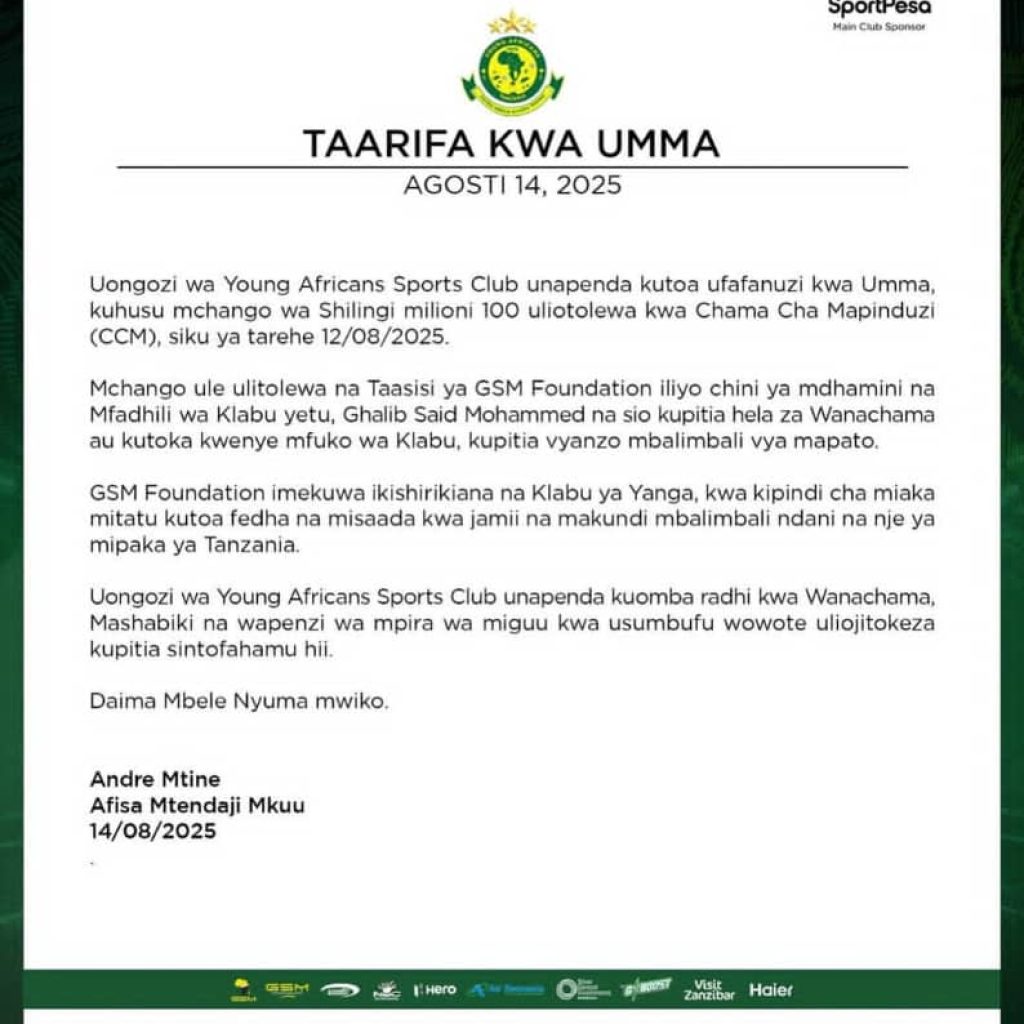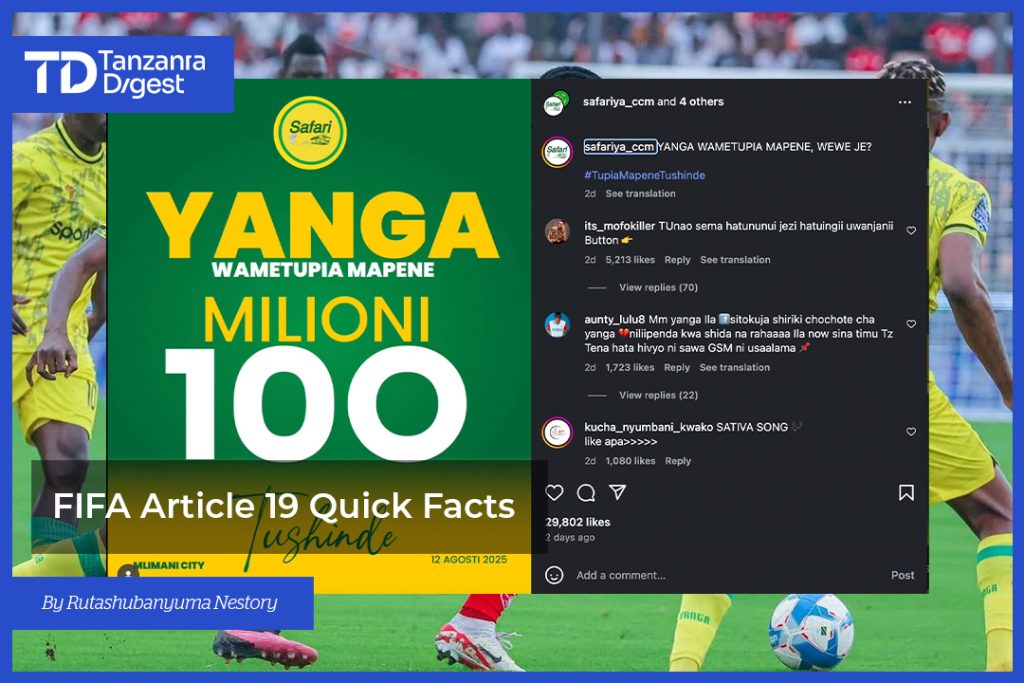Yanga and Simba Sports clubs of Tanzania made political contributions to the ruling party CCM amounting to Tshs 100 Mill and 300 Mill respectively. Simba clouded their donations as “Friends Of Simba” while Yanga didn’t muster the foresight to hide their devious act potentially exposing themselves to the wrath of violations of FIFA Articles 19, among others.
Simba’s predicament is shrouded in its associates but since it is yet to distance itself in public with her supporters ought to be deemed a ringing endorsement of the improper donation. This mirrors when fans misbehave during matches, clubs take full responsibility for the actions of their supporters. Similarly, the matter at hand holds the same grave ramifications.
Yanga and Simba ties to CCM can be traced to pre-independence days and may explain why permanently severing those links is a monumental challenge. Many Tanzanians enter into football management to burnish their political connections in order to gain favours. Some local big businesses run directly or indirectly football clubs reinforcing their flimsy political affiliations. Yanga chairperson attempted to win CCM nomination in order to be an MP. He was unsuccessful but through political donations, he is fortifying his political future.
Some of the highest CCM campaign contributions hailed from informal leaders of either Yanga or Simba, and executed business with the government provoking serious conflict of interest. For example, there is a video in circulation of a Tanzanian who is questioning the motive behind GSM Tshs 10 Bill CCM campaign contribution. Without directly accusing GSM, the content creator alluded in the past one of those CCM contributors had ruthlessly engineered a mass displacement of people, and demolition of a school in order to secure an “off ramp” for a dry land port in Dar-es-Salaam. GSM owners are top Yanga sponsors, and brandish an ironclad vice on how Yanga is managed.

Yanga has issued a public apology to its fans, claiming chief sponsor GSM had added Tshs 100 Mill on behalf of Yanga. This excuse is still as good as no defence. Soccer clubs cannot fund political activities without shredding their impartiality status. The conduct of its sponsor is a structured good as Yanga has done it. So it is a lame excuse. FIFA will still discipline Yanga. The defence has now become an admission of wrongdoing. Yanga is now guilty as charged.
This article reviews what is at stake and whether Yanga and Simba may face FIFA imposed fines for dabbling in local politics.
FIFA Sanctions for Political Donations: Precedents, Statutes, and Risks for Tanzanian Yanga & Simba Clubs.
FIFA, as an international sports organization, generally prohibits its member clubs from donating to political parties. This aligns with FIFA’s principle of remaining politically neutral
and avoiding any actions that could be perceived as interference in political matters. FIFA’s statutes and regulations emphasize the importance of maintaining the integrity and impartiality of football.
Based on FIFA’s statutes and regulatory framework, the prohibition against political affiliations and interference is primarily established in ”Article 19” of the FIFA Statutes (2023 edition), supported by complementary articles. Here is a detailed breakdown:
Article 19: Independence of Member Associations.
Article 19(1):
Mandates that member associations (e.g., national football federations) must manage their affairs “independently and without undue influence from third parties” (including governments, political parties, or external entities).
Article 19(2):
Requires associations to ensure their governing bodies are “elected or appointed via democratic procedures”, guaranteeing complete independence from external actors.
Consequences of Violation:
FIFA may refuse to recognize improperly appointed bodies (Article 19(3)) and invalidate their decisions (Article 19(4)).
Article 15: Statutory Obligations for Good Governance.
Article 15(c):
Explicitly states that member associations’ statutes must enshrine principles of “political neutrality and independence”, including “avoidance of any form of political interference“.
Article 14: Duties of Member Associations.
Article 14.1(h)(i):
Obligates associations to “manage their affairs independently and ensure no influence from third parties“.
Article 14.1(a):
Requires compliance with all FIFA statutes and decisions.
Enforcement Mechanisms.
Suspension Power (Article 16):
FIFA’s Council can suspend member associations for violations, cutting off access to international competitions, funding, and FIFA recognition.
Examples:
Nigeria (2014): Suspended after government-appointed officials replaced elected football executives; lifted after reinstatement.
Kuwait (2015–2017): Suspended for 2 years due to non-compliant sports laws; lifted after legal reforms.
Zimbabwe, Kenya, Chad: Similar suspensions for government interference.
Implications for Clubs (e.g., Yanga Africans & Simba SC).
Clubs donating to political parties (e.g., Tanzania’s CCM) violate FIFA’s principles by facilitating third-party interference. Potential sanctions include:
Fines, points deductions, or transfer bans for clubs.
“Suspension of the national association” if political ties compromise its independence.
Conclusion.
“Article 19” is the cornerstone of FIFA’s ban on political affiliations, reinforced by Articles 14–16. These rules aim to preserve football’s autonomy globally. Recent cases (e.g., Tanzania’s clubs) demonstrate FIFA’s strict enforcement, risking sanctions for clubs and national associations that engage in political activities. For further details, refer to FIFA’s “Statutes” (2023), Articles 14–16 and 19.
FIFA’s Political Neutrality Mandate: Article 19 Violations and Sanctions for Clubs & Associations.
Based on FIFA’s statutes prohibiting political involvement by football entities and documented precedents, the following actions could be taken against Yanga Africans and Simba SC for their donations to Tanzania’s ruling party (CCM):
Formal Investigation & Sanctions Process.
Mandatory Inquiry: FIFA’s Ethics Committee must launch an investigation to verify the donations’ source (club funds vs. private contributions) and compliance with Article 19 of FIFA Statutes prohibiting political interference.
Evidence Review: Scrutiny of club financial records, public statements (e.g., Yanga’s spokesperson justifying donations as “historical practice”), and TFF’s role in oversight.
Range of Potential Disciplinary Measures.
Fines: Likely imposition of significant fines (e.g., $50,000–$500,000) based on precedent, such as FIFA’s penalties for Nigerian clubs in politically linked cases.
Points Deductions: Possible deduction of league points (e.g., 3–6 points) for violating neutrality, mirroring sanctions in Algeria (2021) and Kenya (2018) for similar breaches.
Transfer Bans: Temporary prohibition on player registrations to penalize operational capabilities.
Suspensions: Officials involved (e.g., Yanga president Hersi Said) could face multi-year bans from football activities.
Precedents from African Football Governance.
Nigeria (2014): FIFA suspended the Nigerian Football Federation (NFF) after government interference in leadership appointments. The suspension was lifted only after court orders were revoked.
Kuwait (2015–2022): Extended suspension due to sports legislation enabling government control over football associations, costing Kuwait participation in World Cup qualifiers.
Tanzania (2000): FIFA reinstated ousted TFF officials accused of corruption, citing “government interference,” and imposed reforms under FIFA oversight.
Mitigating Factors in Tanzania’s Context.
Club Ownership Structure: Yanga and Simba operate as “community-owned” clubs with historical ties to political entities, complicating separation of roles. FIFA may mandate structural reforms (e.g., converting to private entities) to depoliticize management.
Fan and Political Backlash: Widespread criticism from fans and opposition figures (e.g., CHADEMA party) alleging coercion could lessen sanctions if clubs prove donations were involuntary.
TFF’s Complicity: If the Tanzania Football Federation approved the donations, FIFA might impose broader sanctions on TFF, including suspension from international competitions.
Broader Implications & Preventive Measures.
FIFA “Normalization Committee“: Appointment of an interim body to oversee club governance reforms, as done in Cameroon (2020) and Pakistan (2023).
Conditional Funding: Withholding FIFA development grants ($250,000/year) until compliance is verified, per audits in Kenya (2000) where funds were misused.
Educational Mandates: Compulsory workshops on political neutrality for club officials, enforced via FIFA’s regional offices.
Conclusion: Article 19 of FIFA Statutes: Prohibiting Political Affiliations and Penalizing Violations.
FIFA will likely impose fines, points deductions, and governance reforms, avoiding full club suspensions if Tanzanian stakeholders demonstrate compliance. However, failure to address systemic political entanglements could escalate sanctions, jeopardizing Tanzania’s participation in CAF/FIFA tournaments. Long-term resolution requires divorcing club operations from state-affiliated funding and leadership.

